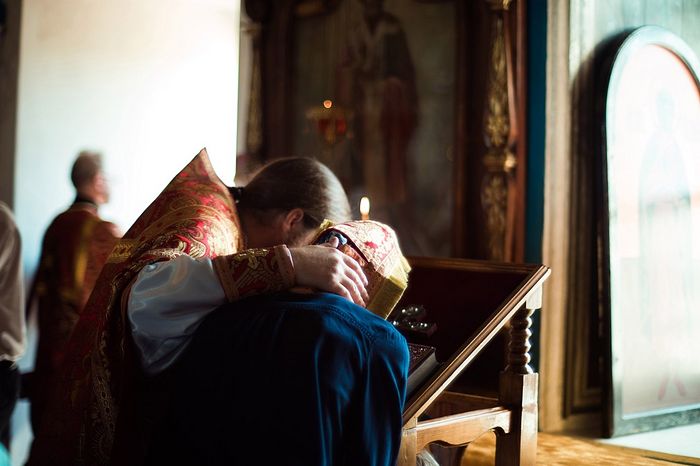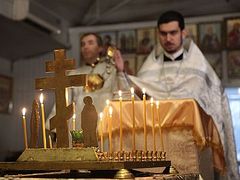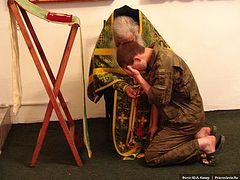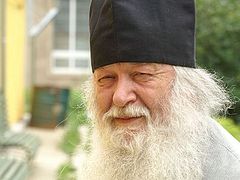When I read the article of Nun Natalia (Kaverzneva), “A Great Sinner,” I recalled a similar situation.
It happened in the city cathedral. I’m not there often lately—I go more often to the small church under construction on the outskirts of the town. But here I was vouchsafed to get to the Cathedral for Vigil one of the weeks after Pascha.
I was standing with my wife in line for confession, waiting for the priest.
There weren’t many people in church: There were fifteen people in the main section of the church (absorbed in the service) and twenty in the narthex (absorbed in their upcoming confession).
The people were in five rows of four. There were few people, and I felt some joy in my soul: Confession won’t drag on today.
We waited, we languished, not really hearing the service; some people were rustling papers, some looking at the floor, some out the window. In a word, we were frozen in anticipation of absolution for our sins.
Archpriest Stephen arrived.
Somewhere around the feast of the Nativity, Batiushka was transferred from the suburbs and appointed as a cleric of the cathedral. Fr. Stephen is full of energy, with an incredible power of spirit and faith; when he blesses you with the Sign of the Cross, he goes all the way from shoulder to shoulder; if you hold out your hands to him for a blessing, he powerfully covers them with his hand and squeezes so you feel your bones crunch and the grace of God flowing from him to you, as if through an antenna; and if he has a cross in his hands, beware—it’s as if the grace is imprinted upon your forehead.
Batiushka does everything crisply, sweepingly, but with some incredible kind of love. In a word, he is a podvizhnik.
He spread the Gospel and cross out on the analogion stand, blessed everyone with the Sign of the Cross, and began to read the prayers before confession.
And then suddenly, a woman parishioner, forty years old, heavy, with an overloaded bag, unceremoniously crammed herself into the first row. The bag drew my attention to her. She couldn’t figure out where to put it for a long time: First she placed it on the windowsill, then on the floor, then on the bench, then she slid it to the left, then she moved it to the right. In the end, she decided to leave it on the bench, and she bent down and pulled a notebook out of it.
Just then the priest finished reading the prayer. He stood by the analogion and quietly said: “Come.” The woman went first… Somewhere around the third page people began to sigh; on the fifth—to shift from one leg to the other; on the seventh, probably many of us started having sinful thoughts, as if that would speed the process up. The pages didn’t end, and the priest was completely attentive: It seemed he was immersed in her problems and was somewhere else with her, not with us.
By the middle of her confession, I couldn’t stand it, and I left the line and went into the nave of the church. It was cool there and the service was going on. I stood in the aisle so I could see both the service and the priest at the analogion.
My wife remained in line among the more persistent ones, and it turned out that we saw and heard what happened later from different positions and different angles.
Unable to endure the trial of languor, one lady in line started to sneer about yet another page being turned: “How much do you have to sin to fill up the entire notebook!...”
Among the confessors was another woman parishioner, probably someone’s matushka, because she was more aware of what was going on and knew who was standing under the priest’s stole.
“Don’t laugh, she’s ill,” the matushka said, turning to the joker.
The people stood motionless, because it was said with compassion.
One more page was turned, and finally the voice of Fr. Stephen, authoritative and resolute, rang out over the penitent: “I forgive and absolve thee of all thy sins, in the name of the Father, and of the Son, and of the Holy Spirit. Amen.”
I was standing in a spot where I could easily see how the woman, moving away from the analogion after kissing the Gospel and cross, suddenly shuddered all over, and pointing her finger somewhere into the void, said: “Oh, one of the commanders is here! Go away, go away; see how I listened to you!” and she began to cough, hoarsely, bubbling, guttural, convulsive. The coughs kept hitting her and hitting her. One minute, two, three, four, five…
Everyone waiting for confession was standing and watching the poor woman, and probably pitying her in their souls. And the matushka again turned to the woman, now white from horror, and added: “You see… Never laugh at anyone in church.”
The lesson was edifying, and the main thing is that it wasn’t in vain. Those standing in the narthex saw the power of God, sent down through the priest.
All the energy, power, and faith of Fr. Stephen was directed towards one thing: To beg for help. And God helped.
I don’t know if all the demons came out with the coughing or not, but if we hypothetically say that with one convulsive cry out came one demon, then his name was Legion.
The next day, Sunday, I went to a different church. I had practically forgotten the story; it would have been erased from my memory, if not for reading the story, “A Great Sinner.”
Our heroes have something in common: He was sick, and she was sick—he with one sin, and she with a whole notebook. And yet they both sought healing in the Church. It was difficult, and probably frightening for them, but they came to God, because they believed and they knew that Christ was more likely to weep and forgive than to laugh and say: “And you, brother, the writer, have sinned ten volumes’ worth.”





